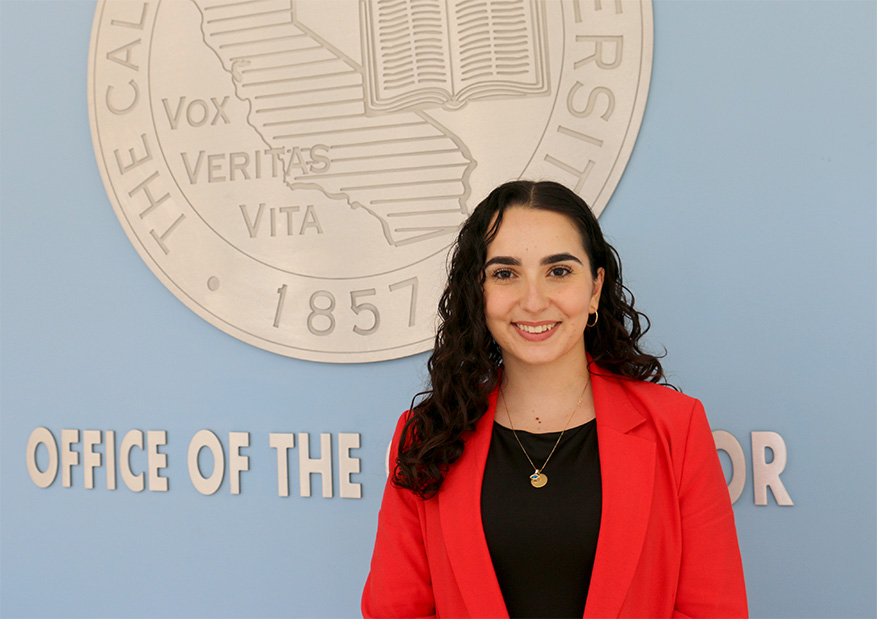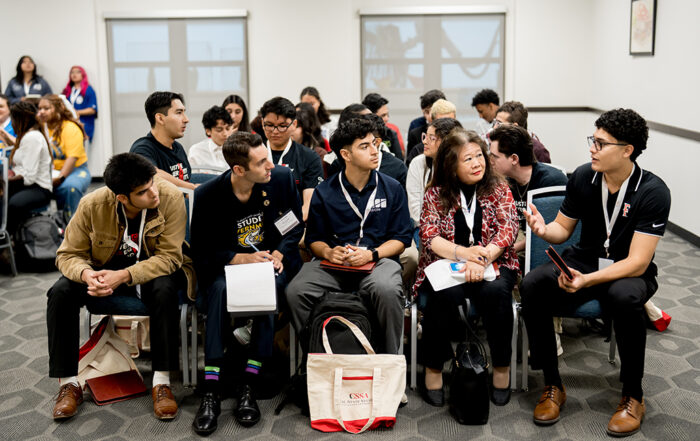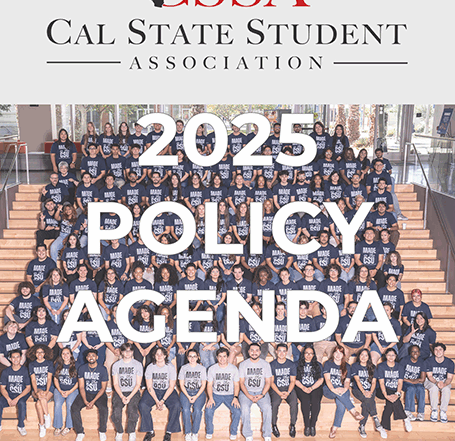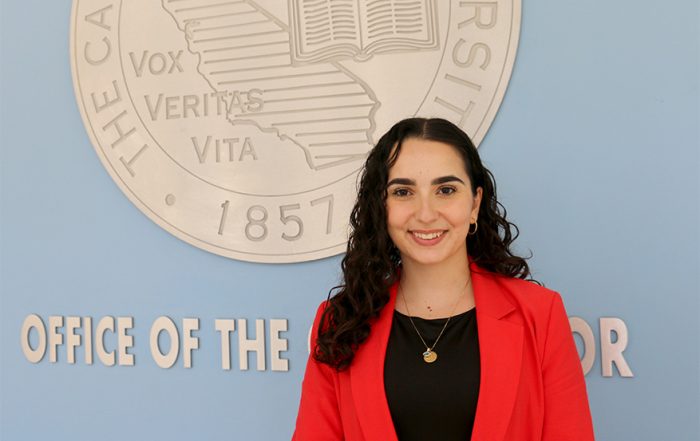
CSSA President Al-Rehani’s report to the CSU Board of Trustees
September 9, 2025
Thank you and good morning, Chair Clarke, Trustees, Chancellor García, University Presidents, and everyone else here today.
Representing nearly half a million CSU students, the Cal State Student Association (CSSA) serves as the official voice of CSU students to both the California State Legislature and the CSU Board of Trustees. I am humbled and honored to present this report on their behalf today.
Since my last report to this board, CSSA convened for our August Plenary and successfully held our 13th annual CSUnity conference at Cal State Fullerton. A very big thank you to University President Dr. Rochon, ASI President Haneefah Syed, and CSU Fullerton staff for welcoming us and helping us put this amazing conference together. We were also very pleased to welcome Chair Clarke, Vice Chair Arambula, and Trustee Yee-Melichar to our conference. Joined by nearly 170 students and 20 guest presenters who came from all over the state, and from our very own CSU backyard, we are very thankful to those in this room who not only attended, but led a variety of development and informational sessions for our students. Deputy Vice Chancellor Perez, Associate Vice Chancellor Dr. Goward, Assistant Vice Chancellor Kitchell, Assistant Vice Chancellor Murrillo, and Director Tran-Martin, thank you. Our sessions included discussions about CSU hot topics such as Title IX & Discrimination, Harassment and Retaliation, the CSU Budget, and the Student Success Framework. We also discussed strategies to mobilize, address student homelessness, improvements to basic needs research, and so much more. It was a weekend full of collaboration, brainstorming, and collective action.
As I’ve mentioned to this body before, we recognize that public higher education is under considerable pressure on multiple fronts, however I’m happy to see that the CSU is doing what it can, where it can. The next few months will be critical as strategic plans across the CSU are nearing their final developmental stages. Later today, you’ll hear the final report for the Year of Engagement: Student Success Framework, and the special report on the CSU Systemwide Strategic Plan in collaboration with SOVA Solutions. I want to highlight that both of these initiatives represent the CSU’s ongoing commitment to continue to make quality education more accessible and affordable.
Times ahead are tough, frankly, times are tough right now, but at the center of everything, the north star are the students. Our request is that we keep this focus at the heart of our work. While there will always be many important priorities to balance, we hope the implementation of this effort continues to place students first, so we can fulfill our promise to them.
If we do not engage our students or make them feel heard, seen, appreciated, and supported, we risk losing their support when they graduate or they may even lose confidence in further pursuing their education at the CSU. I know this is an outcome that no one wants, but I’ve been fortunate enough to be a part of the process with the CSU/Deloitte Steering Committee from the beginning, and can assure that the presentation you will hear later comes after months of deliberate and intentional discussion around strategy and solutions. It will dive into some hard truths about the student experience, both inside and outside of the classroom. They are truths that we must acknowledge. Ahead of that presentation, I would like to reaffirm a few points: students face immense financial barriers, we face transportation and housing challenges, there are gaps in intentional and personalized advising, and a disparity in access to holistic support services. While the system and individual universities have undoubtedly been trying to combat these issues, and we are grateful for these efforts, I would like to underscore the importance of addressing these issues at the systemwide level; and I commend the tireless work and consideration from all the steering committee members and CSU partners on these initiatives. I had re-stated these more obvious issues because the Student Success Framework, the CSU strategic plan, and the Strategic Enrollment Management Plan all tackle these issues in their own relevant ways. A prime example is the strategy details outlined in the Student Success Framework found within today’s agenda (page 54). The strategies look at the real, holistic student experience, starting with the cost of attendance, then advising, through the classroom, and up until they have been set up with a professional network. It outlines the shortfalls and clearly states the systemwide actions that need to be taken.
Having said that, once these plans take effect, it is crucial that our implementation process remains student-centered, and we must continue to create pathways to streamline efficiency and systemwide improvements. Tough decisions will have to be made at future meetings, which is why it is also important to recognize that the associated costs of these initiatives must be reflected and adequately supported, in order to sustain true equity-focused practices. By committing the necessary resources, we affirm that student success remains at the heart of every decision we make.
While CSSA’s Policy Agenda is still undergoing revisions for this year, I can confidently say that our top priorities continue to be focused on attaining an affordable total cost of attendance in the CSU, enhancing shared governance, and equitable access to education. I am also confident that these goals will continue to be represented in our final draft, which I will share during a future report, once approved by CSSA’s board. I think it is crucial to note that preliminary feedback from our governing members also expressed significant interest in advocating against recent immigration-related attacks.
I must acknowledge the continued fear and anxiety that our local communities are presently facing from immigration enforcement. Immigration threats from our federal government have not ceased, which is the very grim, very real, and very unfortunate truth. Nevertheless, no student should be targeted for coming from an undocumented, mixed-status, or international background while simply pursuing their education. I understand that this sentiment is shared amongst many in this room, therefore I urge our system to continue to discuss and consider the realm of possibility for what can be done to aid our communities during this time. Our students need to depend on us.
In the spirit of supporting our students’ safety on campus, I’m pleased to say that Senate Bill (SB) 98, authored by Senator Pérez, currently sits on the Governor’s desk for a signature. SB 98 would require school safety plans to include procedures for notifying parents, guardians, students, and staff when immigration enforcement is confirmed on school grounds. CSSA Chair Villarreal was able to join Senator Pérez, the State Superintendent for Public Instruction Tony Thurmond, Assemblymembers Muratsuchi and Ortega, as well as other stakeholders and statewide student organizations to speak to the importance of this legislation just last week at a joint press conference.
Know that CSSA will continue to advocate for legislation that advances equity, affordability, and student success.
Additionally, one of CSSA’s supported bills, Assembly Bill 313, authored by Assemblymember Ortega, was already signed into law. This bill will ensure that students aren’t penalized when FAFSA delays occur by allowing automatic extensions to financial aid deadlines.
Currently, there are two other CSSA-priority bills moving through the legislative process, SB 271, by Senator Reyes and co-sponsored by CSSA, which would expand “basic needs” services to explicitly include childcare resources and support, including financial assistance for student parents.
As well as SB 761, by Senator Ashby, which would simplify student eligibility for CalFresh by recognizing all public higher education programs as state-approved employability programs by July 2026.
Governor Newsom’s signature on these bills will be critical. By signing them into law, he has the opportunity to directly support California students by improving access to food, childcare, safety, and educational equity.
I’m happy to add that some of the upcoming topics of discussion for our organization will include the AI integration, the CSU Strategic Plan, and the Strategic Enrollment Management Plan. Most recently, CSSA Vice President of Systemwide Affairs Katie Karroum gave testimony at the Artificial Intelligence-Empowered Initiative hearing alongside our CSU partners. I will also note CSSA’s enthusiastic involvement in the various steering committees and strategic planning efforts held by the CSU. CSSA appreciates everyone who has offered to bring these matters directly to our student leaders, and I look forward to our continued collaboration with the CSU and all of its stakeholders as we engage in these discussions. I will be sharing our board’s perspectives across these different areas in a future report.
Before I close out, a sincere congratulations to all the student awardees who will be recognized later, I look forward to chatting with you all.
Chair Clarke, thank you for the time, we sincerely appreciate all of you for listening to the voices of our students with care. This concludes my report.



